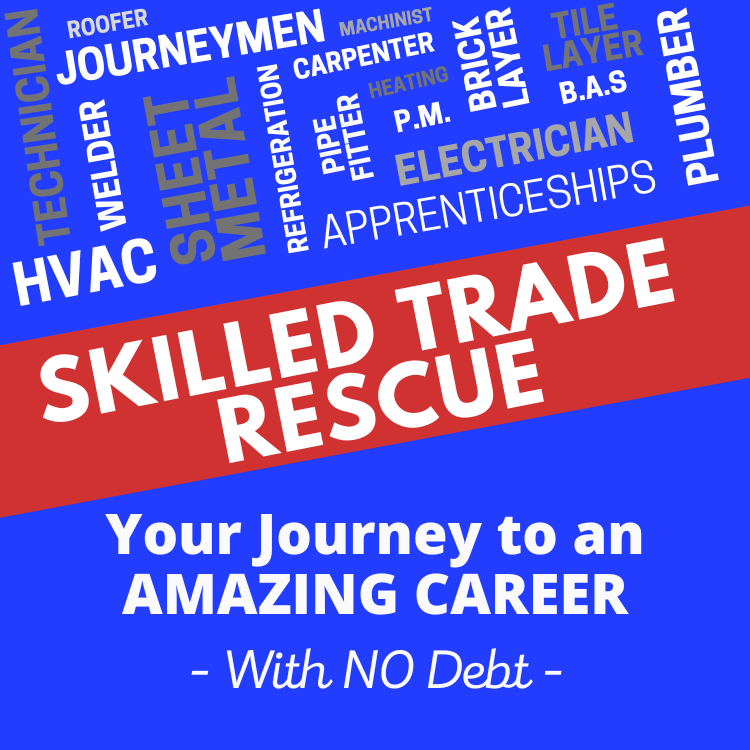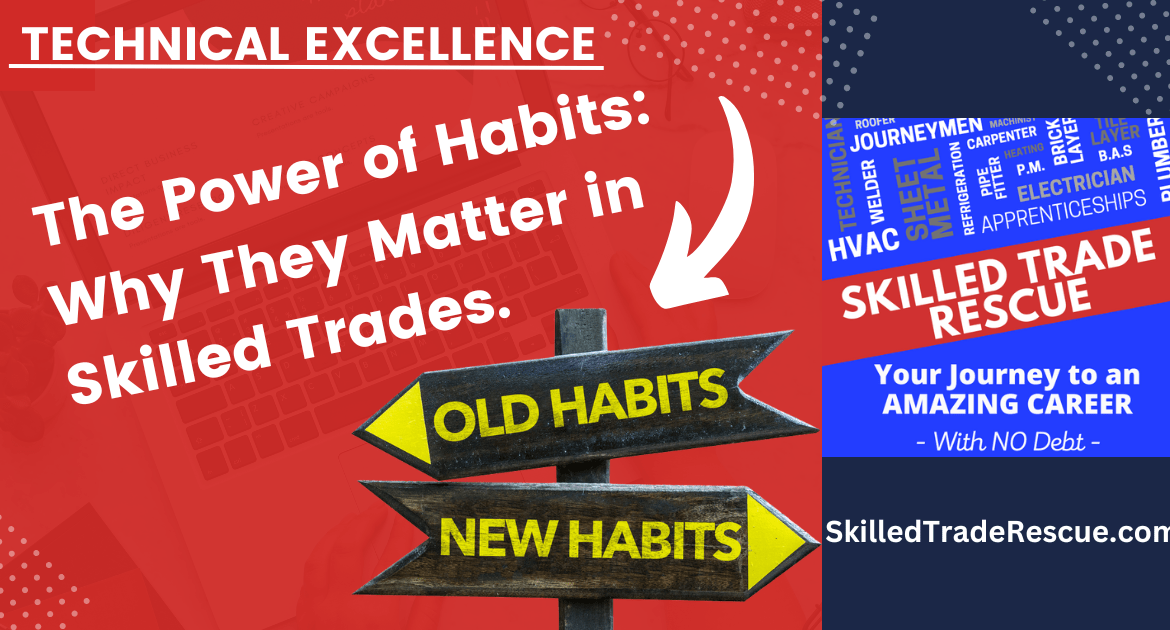The role habits play in achieving technical excellence in skilled trades. Develop good habits, avoid bad ones, and unlock success on the job.
Let’s look at habits, shall we? What are they, and more importantly, what role do habits have in your skilled trades technical excellence journey? To do this, we should first look at some basic information on the human brain and the formation of habits. Understanding the power of our habits and how to manage both good and bad habits is one of the keys to unlocking success on the job and in your personal life.
The brain is lazy. Each day, the human brain processes an amazing amount of data. Although car analogies are overused, I will run with this one because my brain is lazy too.
Millions of humans, some better than others, drive automobiles daily. This activity is essential for us to get to work, drive our kids around, and pick up food, etc. This activity requires our brain to process hundreds of complex observations, calculations, and muscular output responses per second. It is no wonder that computers, as powerful as they have become, are just now starting to take driving on.
Despite the complex computing needed to drive, how can most of us perform this task without thinking about it? Well, it’s because our brains are lazy. Over time, the brain recognizes patterns in processes and moves these patterns off into long-term storage, so it does not need to work so hard. Let’s break this concept down to just one of the thousands of things our brain does when we get behind the wheel and put on our seatbelt.
So, you sit in the seat and are ready to go. In an instant, your brain goes into your long-term memory and plucks out a little saved program called putting on my seatbelt. Without thinking about it, your hand reaches the belt connector near your left shoulder, slings it across your body, and into the buckle by your right hip. If you have owned the car for a while, your eyes may have never left the front windshield. This task, start to finish, was done completely by feel in likely around two seconds. This simple example highlights the brain’s ability to get the job done without needing to work hard.Let’s look at habits, shall we? What are they, and more importantly, what role do habits have in your skilled trades technical excellence journey? To do this, we should first look at some basic information on the human brain and the formation of habits. Understanding the power of our habits and how to manage both good and bad habits is one of the keys to unlocking success on the job and in your personal life.
The brain is lazy. Each day, the human brain processes an amazing amount of data. Although car analogies are overused, I will run with this one because my brain is lazy too.
Millions of humans, some better than others, drive automobiles daily. This activity is essential for us to get to work, drive our kids around, and pick up food, etc. This activity requires our brain to process hundreds of complex observations, calculations, and muscular output responses per second. It is no wonder that computers, as powerful as they have become, are just now starting to take driving on.
Despite the complex computing needed to drive, how can most of us perform this task without thinking about it? Well, it’s because our brains are lazy. Over time, the brain recognizes patterns in processes and moves these patterns off into long-term storage, so it does not need to work so hard. Let’s break this concept down to just one of the thousands of things our brain does when we get behind the wheel and put on our seatbelt.
So, you sit in the seat and are ready to go. In an instant, your brain goes into your long-term memory and plucks out a little saved program called putting on my seatbelt. Without thinking about it, your hand reaches the belt connector near your left shoulder, slings it across your body, and into the buckle by your right hip. If you have owned the car for a while, your eyes may have never left the front windshield. This task, start to finish, was done completely by feel in likely around two seconds. This simple example highlights the brain’s ability to get the job done without needing to work hard.
Habits in Skilled Trades
So, how do habits play a role in skilled trades, and why are they important? Skilled trades require a high degree of technical expertise, experience, and knowledge to do the job correctly. This expertise requires a lot of mental and physical effort, which is where habits come into play.
Good habits, like wearing personal protective equipment (PPE) or following safety protocols, can help prevent accidents and injuries. They can also make skilled trade work more efficient and improve the quality of the work done. Bad habits, like taking shortcuts or not following procedures, can lead to accidents, injuries, and poor work quality.
Developing Good Habits in Skilled Trades
Developing good habits in skilled trades is essential for success. The following steps can help you develop good habits that will serve you well in your technical excellence journey:
1) Start with a goal: Identify the habits you want to develop and set a clear goal for yourself.
2) Create a plan: Develop a plan to help you achieve your goal. Break your goal down into smaller, achievable steps.
3) Be consistent: Make a commitment to stick to your plan, and be consistent in your efforts.
4) Track your progress: Keep track of your progress, and celebrate your successes along the way.
5) Get feedback: Seek feedback from others, such as colleagues, supervisors, or mentors, to help you improve.
Breaking Bad Habits
Breaking bad habits in skilled trades can be challenging, but it is necessary for success. The following tips can help you break bad habits and replace them with good ones:
1) Identify the habit: Recognize the bad habit and understand the consequences of continuing it.
2) Create a plan: Develop a plan to break the habit and replace it with a good one.
3) Start small: Break the habit down into smaller, achievable steps.
4) Find a replacement: Identify a good habit to replace the bad habit, and focus on developing the new habit.
5) Stay accountable: Stay accountable to yourself, and seek support from others, such as a mentor or colleague, to help you stay on track.
How Habits Impact Your Skilled Trade Success
Habits can have a significant impact on your skilled trade success. Good habits can help you work more efficiently, improve the quality of your work, and prevent accidents and injuries. They can also help you build a reputation as a reliable and skilled trades professional.
On the other hand, bad habits can lead to poor work quality, accidents, injuries, and a negative reputation. They can also hinder your progress and limit your opportunities for advancement.
Bottom Line, habits play a significant role in skilled trades technical excellence journey. Developing good habits and breaking bad ones can be challenging, but it is necessary for success. By understanding the power of habits and learning how to manage them effectively, you can unlock your full potential and achieve success in your skilled trade career.
Facts, Figures, and Statistics on the subject of habits:
1) According to a study by Duke University, habits make up 40% of our daily actions.
2) Research shows that it takes an average of 66 days to form a new habit.
3) A survey by the National Safety Council found that 58% of workplace injuries are caused by unsafe behaviors or actions. Much of this connects to bad work habits that creep into work activities over time.
This blog post uses data from our NEW EBOOK: Skilled Trades, Technical Excellence. How to transform from average to a Millionaire without college debt. Now available for purchase at this link:> http://bit.ly/3Ee5Nfb
Unlock your full potential in the skilled trades industry by visiting SkilledTradeRescue.com, your go-to source for inspiring and transformative content. Whether you’re looking to enhance your skills or take your career to the next level, our expert-led tips and resources will help you achieve your goals. Stay connected with us on Youtube, Facebook, or LinkedIn for daily inspiration and updates on the latest industry trends.
How useful was this post?
Click on a star to rate it!
Average rating 0 / 5. Vote count: 0
No votes so far! Be the first to rate this post.





